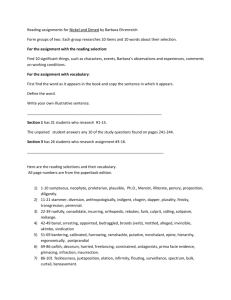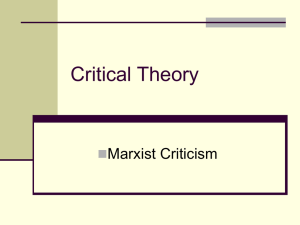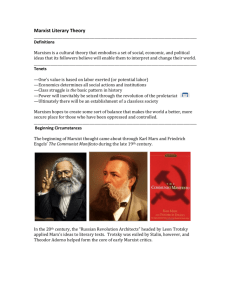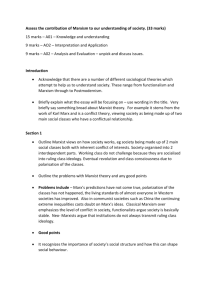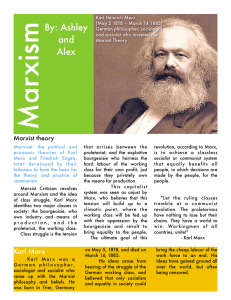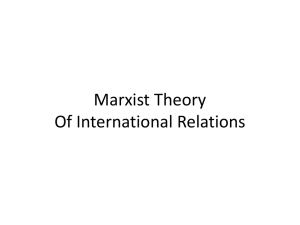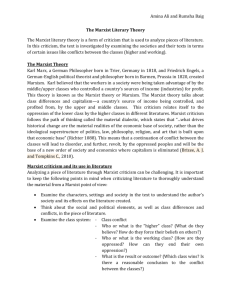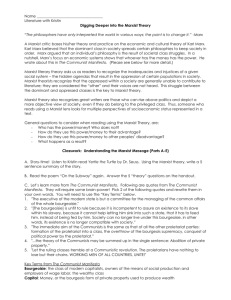WEEK 7 Marxist Analysis
advertisement
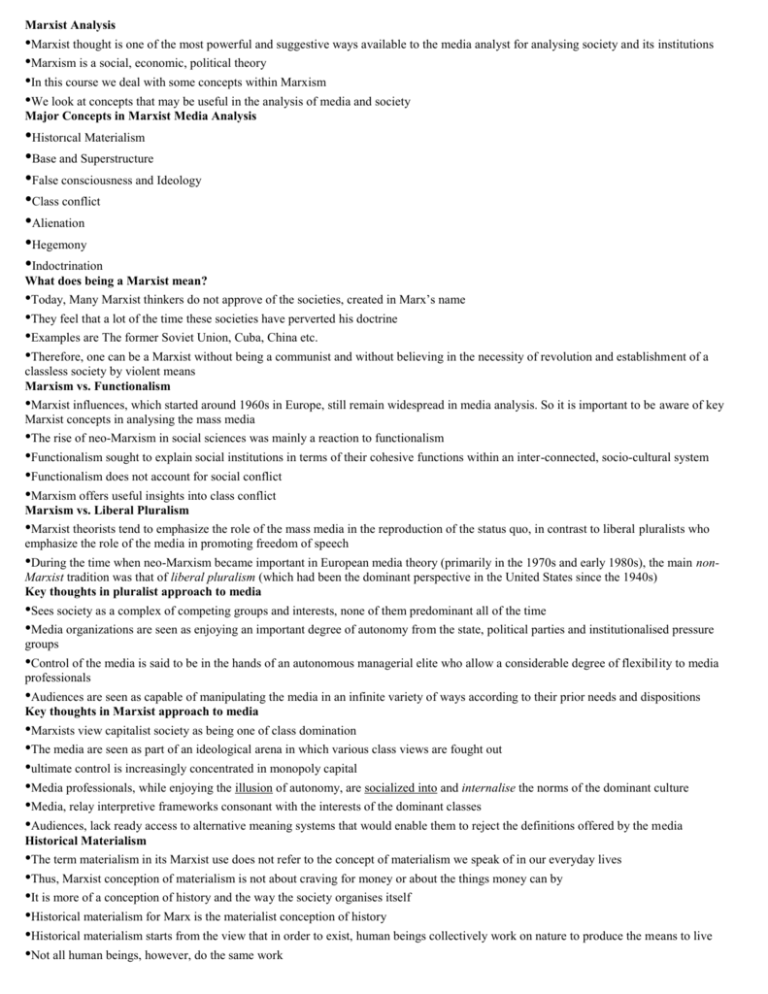
Marxist Analysis •Marxist thought is one of the most powerful and suggestive ways available to the media analyst for analysing society and its institutions •Marxism is a social, economic, political theory •In this course we deal with some concepts within Marxism •We look at concepts that may be useful in the analysis of media and society Major Concepts in Marxist Media Analysis •Historıcal Materialism •Base and Superstructure •False consciousness and Ideology •Class conflict •Alienation •Hegemony •Indoctrination What does being a Marxist mean? •Today, Many Marxist thinkers do not approve of the societies, created in Marx’s name •They feel that a lot of the time these societies have perverted his doctrine •Examples are The former Soviet Union, Cuba, China etc. •Therefore, one can be a Marxist without being a communist and without believing in the necessity of revolution and establishment of a classless society by violent means Marxism vs. Functionalism •Marxist influences, which started around 1960s in Europe, still remain widespread in media analysis. So it is important to be aware of key Marxist concepts in analysing the mass media •The rise of neo-Marxism in social sciences was mainly a reaction to functionalism •Functionalism sought to explain social institutions in terms of their cohesive functions within an inter-connected, socio-cultural system •Functionalism does not account for social conflict •Marxism offers useful insights into class conflict Marxism vs. Liberal Pluralism •Marxist theorists tend to emphasize the role of the mass media in the reproduction of the status quo, in contrast to liberal pluralists who emphasize the role of the media in promoting freedom of speech •During the time when neo-Marxism became important in European media theory (primarily in the 1970s and early 1980s), the main nonMarxist tradition was that of liberal pluralism (which had been the dominant perspective in the United States since the 1940s) Key thoughts in pluralist approach to media •Sees society as a complex of competing groups and interests, none of them predominant all of the time •Media organizations are seen as enjoying an important degree of autonomy from the state, political parties and institutionalised pressure groups •Control of the media is said to be in the hands of an autonomous managerial elite who allow a considerable degree of flexibility to media professionals •Audiences are seen as capable of manipulating the media in an infinite variety of ways according to their prior needs and dispositions Key thoughts in Marxist approach to media •Marxists view capitalist society as being one of class domination •The media are seen as part of an ideological arena in which various class views are fought out •ultimate control is increasingly concentrated in monopoly capital •Media professionals, while enjoying the illusion of autonomy, are socialized into and internalise the norms of the dominant culture •Media, relay interpretive frameworks consonant with the interests of the dominant classes •Audiences, lack ready access to alternative meaning systems that would enable them to reject the definitions offered by the media Historical Materialism •The term materialism in its Marxist use does not refer to the concept of materialism we speak of in our everyday lives •Thus, Marxist conception of materialism is not about craving for money or about the things money can by •It is more of a conception of history and the way the society organises itself •Historical materialism for Marx is the materialist conception of history •Historical materialism starts from the view that in order to exist, human beings collectively work on nature to produce the means to live •Not all human beings, however, do the same work •there is a division of labour in which people not only do different jobs, but some people live from the work of others by owning the means of production Historical Materialism continued… •These relations of production constitute the economy of the society •The economy in Marxism is seen as the real foundation of a society •Legal and political superstructures and social consciousness are built on this economic foundation •Marx wrote: “it is not the consciousness of men that determines their existence, but, on the contrary, their social existence that determines their consciousness” •This means that everything is shaped by the economic system of a society which in subtle ways effect the ideas that men have Historical Materialism continued… •In this sense Marx argues that “our” ideas are not entirely our own •He argues, knowledge is social and dependent on the economic relations within a society •Moving from here, he claims that in every epoch the dominant ideas are always the ruling elites ideas. •Because the ruling elite have control over material production, they also have control over mental production Some questions to ask •What social, political and economic arrangements characterize the society •Who owns, controls and operates the media? •What role do media play in a society? What are the functions of popular art forms? •What ideas, values, concepts, beliefs are spread by the media, and which ones are neglected? Base and Superstructure •In Marxism, “base” represents the economic system (modes of production) found in a given society •Superstructure refers to institutions and values (the culture at large) of a given society •According to Marxist thought, mode of production influences the “superstructure” in profound and complicated ways •In “Vulgar Marxism” the economic base of society is seen as determining everything else in the superstructure, including social, political and intellectual consciousness. •However, in more recent interpretations of Marxism, rather than a direct determining relationship between base and superstructure, a dialectic between the two is emphasised •We have to understand that capitalism is not only an economic system but also something that affects attitudes, values, and culture in general •We have to understand that ideas are transmitted to man through the institutions, philosophical systems, religious organizations and arts found in a given society at a given time – that is through the superstructure Base and Superstructure continued… •Economic relations may be the ultimately determining ones, but they are not the only ones •It is an oversimplification to say that superstructure is automatically shaped by the base and is nothing but a reflection of it •Consciousness of people has important social, economic and political implications •Many Marxists argue that public arts and media are crucial to understanding how the superstructure thus, consciousness is determined, shaped and manipulated •'the contents of the media and the meanings carried by their messages are... primarily determined by the economic base of the organizations in which they are produced' (Curran et al. 1982: 18) Base, superstructure and media continued… •Commercial media organizations must cater to the needs of advertisers and produce audience-maximizing products •Media institutions whose revenues are controlled by the dominant political institutions or by the state gravitate towards a middle ground, or towards the heartland of the prevailing consensus •The base/superstructure model as applied to the mass media is associated with a concern with the ownership and control of the media Base, superstructure and media continued… •The mass media are, in classical Marxist terms, a 'means of production' •These means of production, in capitalist society are in the ownership of the ruling class •According to the classical Marxist position, the mass media simply disseminate the ideas and world views of the ruling class, and deny or defuse alternative ideas •REMEMBER! Marx wrote: –The class which has the means of material production at its disposal has control at the same time over the means of mental production, so that thereby, generally speaking, the ideas of those who lack the means of mental production are subject to it. (Marx & Engels: The German Ideology False consciousness and ideology •Why than, is influencing mental production thus consciousness so important? •We have to realise that the consciousness of people has important social, economic, and political implications •It is important to affect peoples’ consciousness because by giving people certain ideas it is possible for those who benefit most from the social arrangements in a capitalist country to maintain that status quo •Generally speaking, then, the ideas people have are the ideas that the ruling class wants people to have False consciousness and ideology continued… •False consciousness refers to ideology dominating the consciousness of exploited groups and classes which at the same time justifies and perpetuates their exploitation •By ideology we mean any system of logically coherent and widely applicable socio-political beliefs. •The ruling class propagates an ideology that justifies its status and makes it difficult for the ordinary people to recognize that they are being exploited and victimized •The notion that the masses of people are being manipulated and exploited by the ruling class is one of the central arguments of modern Marxist cultural analysis •Sayfa 37 quote False consciousness and mass media •The mass media and everyday culture play a central role in the spread of false consciousness •The mass media lead people to believe that what ever is. Is right. •The mass media disseminate the dominant ideology: the values of the class which owns and controls the media •Mass media constitute a crucial link between the ‘superstructure’ and individual consciousness •In this sense, according to classical Marxism, the mass media function to produce 'false consciousness' in the working-classes Class conflict •SAYFA 39 QUOTE •For Marx, history is based on unending class conflict –Freeman vs. Slave –Lord vs. Servant –Oppressor vs. Oppressed •The two classes Marx talks about are the bourgeoisie and the proletariat –The bourgeoisie are the people who own the factories and corporations and who form the ruling class –The proletariat are the huge mass of workers who are exploited by this ruling class Class conflict continued… •According to Marxist thinking, the bourgeoisie indoctrinate the proletariat with ‘ruling class ideas’ •This way they avert class conflict –The self made man –The social and economic arrangements in a society are ‘natural’ not ‘historical’ •Generally speaking, the mass media either mask class differences or act as apologists for the ruling classes to prevent changes in the political order •If social arrangements are natural they cant be modified, thus one has to accept a given order as inevitable. •Marxists argue that social and economic arrangements found in a given society at a given time are historical – created by people and therefore capable of being changed •The bourgeoisie try to convince everyone that capitalism is natural and therefore eternal, but this idea say the Marxists is patently false, and it is the duty of Marxist analyst to demonstrate this •Generally speaking, mass media distract people from the realities of our society (poverty, racism, sexism etc). •LeFebvre argues that class conflict and manipulation results for the people of capitalist societies living in a state of terror. •The notion that people living in capitalist societies may look extreme at first, but it may explain why there seems so much pressure on our lives. •The terror we talk about here is psychological terror. •In our everyday lives we are under constant attack (mainly by media) SAYFA 41 Alienation •The word alienation suggests separation and distance •This notion is of central importance to understanding Marxism •Capitalism produces goods and materialist abundance, but it also generates alienation. All classes suffer from this whether they realize it of not •People who live in a state of alienation suffer from false consciousness – a consciousness that takes the form of the ideology that dominates their thinking. •It is also important to note that alienation is invisible and hard to take hold of. •The concept of alienation is very useful to analysts of popular culture. SAYFA 42 QUOTE •People become estranged from their work, from friends, from themselves and from life. •SAYFA 43 QUOTE Consumer society and commodity fetishism •Advertising is an essential institution in advanced capitalist societies –It is necessary to motivate people to work hard and to buy more –People must be made crazy to consume, because consumption maintains the economic system •So, alienation caused by capitalism becomes functional, to escape it or to free oneself from anxieties and miseries generated by alienation, one needs to consume •Advertising generates anxieties, creates dissatisfaction and feeds alienation already present •SAYFA 44 QUOTE •Advertising takes control of everyday life and dominates social relationships •Advertising is a kind of popular art carried by the mass media that has both immediate and long term mission •Immediate mission: sell goods •Long range mission maintain the class system •People have the illusion that they make their own decisions about what to purchase and what to do •Marxism argues that to a great extent, these decisions are made for people, whose acts turn out to be almost automatic responses to stimuli generated by advertising •SYFA 45-46 GUVERCINLERI ANLAT SAYFA 46 QUOTE’U OKUT •Our illusion of autonomy makes us all the more susceptible to manipulation and exploitation. Bourgeois heros •For Marxists, heroes and heroines function so as to maintain the status quo by reproducing capitalist ideology in disguised form and by helping keep consumer lust at a high pitch Marxist Media Analysis In Marxist media analysis, media institutions are regarded as being 'locked into the power structure •Consequently, they are seen as acting largely in tandem with the dominant institutions in society •The media thus reproduced the viewpoints of dominant institutions not as one among a number of alternative perspectives, but as the central and "obvious" or "natural" perspective' (Curran et al. 1982: 21) •According to adherents of Marxist political economy, in the mass media there is a tendency to avoid the unpopular and unconventional and to draw on 'values and assumptions which are most valuable and most widely legitimated' (Murdock & Golding 1977: 37, cited in Curran et al. 1982: 26) Marxist Media Analysis continued… •Many researchers in the Marxist tradition have argued for example –media portrayals of violence serve to legitimise the forces of law and order, –build consent for the extension of coercive state regulation and –de-legitimate outsiders and dissidents •The power of the media is thus portrayed as that of renewing, amplifying and extending the existing predispositions that constitute the dominant culture, not in creating them' (Curran et al. 1982: 14; see also ibid.: 27) •'They have examined the impact of the mass media in situations where mediated communications are powerfully supported by other institutions such as the police, judiciary and schools Marxist Media Analysis continued… •Similarly, 'some Marxist commentators have contended that media portrayals of elections constitute dramatized rituals that legitimate the power structure in liberal democracies •Voting is seen as an ideological practice that helps to sustain the myth of representative democracy, political equality and collective selfdetermination •The impact of election coverage is thus conceived in terms of reinforcing political values that are widely shared in Western democracies and are actively endorsed by the education system, the principal political organizations and the apparatus of the state' (Curran et al. 1982: 15).
